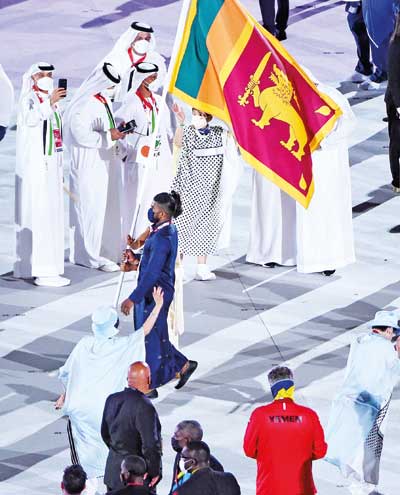Audit report on NOC reveals more troubling issues

The NOC spent Rs. 53,009,144 on scholarships for athletes between 2022 and 2024, yet remarkably, not a single scholarship recipient qualified for the Olympic Games
In a damning audit report, Sri Lanka’s Auditor General has uncovered a series of financial mismanagement issues, questionable spending decisions, and governance failures at the National Olympic Committee (NOC) of Sri Lanka. The findings raise serious concerns about the organisation’s stewardship of resources meant to develop the country’s Olympic athletes and sports programmes.
The report, which examined the NOC’s operations during 2023, comes at a particularly troubling time as the International Olympic Committee (IOC) has imposed financial sanctions against Sri Lanka’s NOC effective last December, with the possibility of complete suspension of membership looming.
Among the most concerning revelations was the failure of the NOC’s scholarship programme for the Paris 2024 Olympics. The Committee spent Rs. 53,009,144 on scholarships for athletes between 2022 and 2024, yet remarkably, not a single scholarship recipient qualified for the Olympic Games. Meanwhile, the six athletes who did represent Sri Lanka at the Olympics received no support from this programme.
The audit also highlighted several instances of questionable spending without proper authorisation. In one case, the NOC spent Rs. 15,450,579 on overseas training for an athlete preparing for the 2023 Asian Games without obtaining approval from the executive committee, the respective national federation, the department of sports development, or the relevant minister. The athlete subsequently failed to qualify for the Asian Games due to poor performance.
In another troubling incident, the NOC advanced US$ 1,430 (approximately Rs. 464,750) to a retired weightlifter for an overseas sports education programme without the consent of the Weightlifting Federation. The individual, who was supposedly being groomed as a coach, never returned to Sri Lanka after completing the programme and has not settled the advance payment.
The report also revealed the NOC’s failure to distribute allocated annual member grants totaling Rs. 5,400,000 and other project-related payments of Rs. 5,266,980 to 18 National Sports Associations during the year under review.
Property management issues have further compounded the NOC’s financial troubles. The gymnasium was leased to an outside party who vacated the premises without settling outstanding balances of
Rs. 2,699,256 as of December 31, 2023. Similarly, a restaurant leased to a private company left Rs. 3,801,979 in unpaid annual rent by the end of 2023. Despite collecting Rs. 683,000 from the leaseholder to renew the restaurant’s bar license, the NOC failed to complete the renewal.
Questions about duplicate expenditures have also emerged. While the NOC hired an external legal consultant for a two-year period beginning February 2023 at a cost of Rs. 935,000 for the year, it simultaneously paid Rs. 6,878,219 to external legal personnel for the same matters.
Other financial irregularities included Rs. 1,602,000 spent on gifts and donations to athletes, officials, and coaches without an approved scheme, and long-standing uncollected receivables from the Cycling Federation of Sri Lanka (Rs. 271,800) and Sri Lanka Baseball/Softball Federations (Rs. 720,047) that have remained outstanding for over three years.
The IOC had granted Rs. 7,109,600 to the NOC for preparing a strategic plan for 2023-2028, yet the Committee failed to complete the plan by December 31, 2023, despite spending Rs. 9,246,111 on the effort.
Perhaps most concerning were the governance issues related to the Commonwealth Games held in 2022. The NOC arranged for 176 people to participate, with six attending without the approval of the Minister of Sports and Youth Affairs. Fourteen individuals did not return to Sri Lanka after the Games, despite the NOC spending Rs. 9,294,968 on behalf of 12 participants during 2022.
As Sri Lanka’s sports community grapples with these revelations, athletes preparing for upcoming international competitions face uncertainty about organisational support and funding. The audit report’s stark findings suggest that comprehensive reforms will be necessary to restore credibility to the National Olympic Committee and prevent further damage to the country’s sporting reputation.


